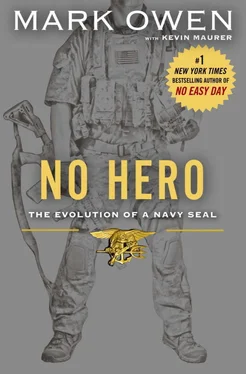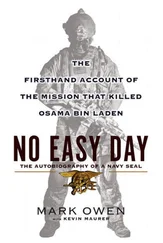Men wanted for hazardous journey. Low wages, bitter cold, long hours of complete darkness. Safe return doubtful. Honor and recognition in event of success.
I would have signed up for Beckwith’s Project Delta and Shackleton’s expedition.
I never wanted to do anything normal. I can’t be average. No one involved in special operations can be average because our missions are never easy or routine. Both Shackleton and Beckwith were looking for a shared sense of purpose and a common mind-set among all their people. If anybody on their crews wasn’t there for the right reasons and for the team’s needs, there was a higher chance of failure. And failure in the special operations community is never tolerated.
Most nights in Iraq, I was perched on the landing skid of a Little Bird—an MH-6 helicopter flown by the 160th Special Operations Aviation Regiment—racing over the rooftops. I’d fast rope to the roof of a building and clear the top floors while my teammates in the trucks on the street cleared the lower levels. The missions were exactly what I signed up to do, but I was doing them with the Army instead of my SEAL teammates. We were waging a massive campaign to dismantle al Qaeda in Iraq.
We called it “Baghdad SWAT.”
But some nights, we didn’t have the Little Birds. If we were going to the roof, we had to climb.
As I crested the parapet wall, I looked back over my shoulder and saw that Jon had reached the roof. I turned and headed for the opposite corner, scanning for any targets. Tile covered the roof and a small two-foot-high parapet wall ran completely around the edge. A door sat in the middle of the roof and a myriad of satellite dishes of all makes and models were attached to the corners of the building. Bundles of thick black power lines ran from building to building, sagging over the road and alleyway.
I had a map of the area in my head and knew the target we were looking for was on the other side of the roof. Over the radio, I heard the ground team searching for the correct door. The enemy safe house was in a duplex, but from the radio traffic the ground team was unsure which door to breach and enter.
From my perch three stories up, I could see the ground team’s trucks. I heard a muffled boom, and the Army operators on the ground started to move into the house. I kept watch on the house, waiting for any sign of movement.
Then word came over the radio. The boys hit the wrong side of the duplex. They were going into the other side of the duplex now. I heard a burst from an AK-47 and some yelling.
“We’ve got squirters,” I heard over the radio.
From our vantage point, I knew that the squirters had to be close, but they were out of sight. We couldn’t see into the alley located to the north of our location because of the building in front of us. We needed to cross over to the other building, but there was no time to go all the way down to the ground floor, move over to the next building, and then clear our way back up three floors to the roof of the other building.
Nearby on the roof, I noticed a ladder. It looked long enough to reach the parapet wall on the other building. From that roof, we’d have a perfect angle down on the alley the enemy fighters were using to escape.
I looked at Jon, but he was working the radio, which was jammed with reports of fighters on the run. The guys inside the building also found a cache of weapons and explosives.
I wanted to get into the action, so I ran over to the ladder. It was made of discarded pieces of wood nailed together. A single nail and some wire held some of the ladder’s rungs on. I grabbed the ladder and put it on my shoulder and ran over to the edge of the building where my teammate waited.
“Think this haji ladder will hold us?” my teammate asked.
We were three stories up. I stood on the lip of the parapet wall and looked across the open space between the buildings. It was about fifteen feet across.
“If we lay it flat and crawl across, I think it will,” I said, hoping more than believing it.
“Either way, we’re about to find out,” he said with a smirk.
We both wanted to get in the fight and stop the squirters from escaping, or worse, setting up an ambush. We gently slid the ladder across the alley. My teammate went first. Lying flat, he slid across the ladder while I held it and kept watch on the other building. When it was my turn, I slung my rifle around behind me so it rested on my back and started to crawl across.
My mind went back to thin ice in Alaska. The only way to get across thin ice is to spread your body weight out as wide as possible. If you stand up, all your body weight is in one spot, and the next thing you know you fall through into freezing-cold water. Like crossing thin ice, crawling across the ladder was very dangerous. We were three stories off the ground, enemy fighters were running around, and we were about to trust this piece-of-shit Iraqi ladder to keep us from falling.
At least in Alaska I hadn’t been wearing the additional sixty pounds of gear.
I took two deep breaths and tried to stay focused. This was one of the many times staying in my three-foot world kept me going, because I still hated heights.
Inch by inch I crawled across the alley. Below, I saw a massive pile of trash. Most of it looked like kitchen waste, with rotting food and various food containers. Plastic bags were blown around the alley, and it looked like a car or truck had hit the waste pile, scattering trash into the middle of the alley.
I never stopped moving and finally made it to the other building. Back on my feet, I raced over to the corner, looking for the squirters. The enemy fighters would have easily gotten away had we hesitated or decided not to use the ladder. I picked up the squirters running at a dead sprint just as we got to the edge of the building and looked into the alley. Both men were carrying rifles.
I could see my teammate’s laser stop on the fighter on the left. I zeroed in on the fighter on the right. We both opened fire and cut the fighters down before they could get to the mouth of the alley. They had gotten lucky when the ground force hit the wrong side of the duplex, but that’s where their luck ran out.
On the other building, Jon heard the shots. Out of the corner of my eye, I could see him hustling over to where we’d left the ladder. I turned back to the alley and kept scanning. My teammates in the house were still clearing rooms and finding weapons, but it was unclear how many fighters were in the safe house.
Above me, I heard AH-6 Little Birds crisscrossing in the sky. They were armed with rockets and machine guns, ready to engage if we ran into trouble. After the first reports of squirters, they started flying in ever-widening circles from the target, looking for fighters who might have escaped.
Then I heard an urgent call over the radio.
“We’ve got a man down,” the Little Bird pilot said.
A few seconds later, the pilot repeated the call.
“We’ve got a man down.”
At first I assumed that the ground force had taken a casualty as they finished clearing the target building. Then the pilot came back with a second report.
“We’ve got a man down roughly one hundred meters south of the target compound,” the pilot said.
That didn’t make sense. I was located one hundred meters from the target with Jon and my team. We’d made contact, but the pilot couldn’t be talking about us. We were fine. The fighters never got off a round.
I glanced over at my teammate. He shrugged. I turned back to see if Jon was on our roof so I could ask him about the radio call.
Jon was gone.
“Where did Jon go?” I asked my teammate. “He was just there talking on the radio.”
“Where’s the ladder?” my teammate said.
Читать дальше










